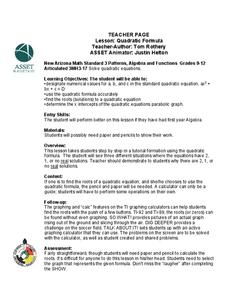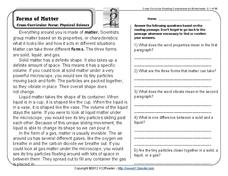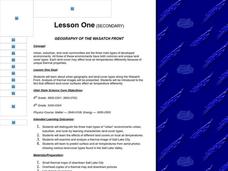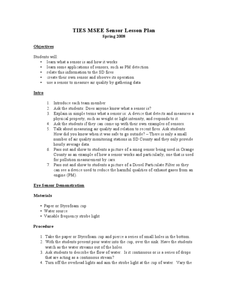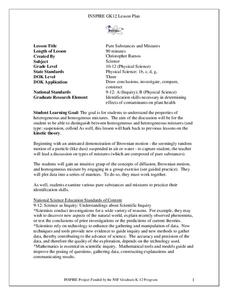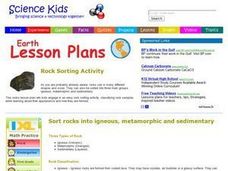Curated OER
Melting Ice
Pupils observe the melting of ice and explore the basic physical changes that occur. They gain information of how different substances change the rate of melting. Students discuss the properties of water and ice, the definition of...
Curated OER
Lung Limit
Learners explore one's lung capacity, the human body, displacing volume of water with volume of air and spirometer use. Using simple math, students figure out their lung capacity by breathing into a bottle filled with water and...
Curated OER
The Egg "Airbag" Lab
Students use what they know about momentum and impulse to construct an effective "air bag" to protect an egg dropped from the top of the football stadium or other tall structure. They complete a final written report of their findings.
Curated OER
Quadratic Formula
Students factor and solve quadratic equations.For this algebra lesson, students identify the roots of an equation using the quadratic formula. They graph and identify the properties of a parabola.
K12 Reader
Forms of Matter
In this forms of matter worksheet, students read a 4 paragraph article about forms of matter, then complete a set of 5 short answer comprehension questions.
Curated OER
Cold Fronts And Warm Fronts
Students simulate the movement of cold and warm fronts as they listen to a story about the weather and Mr. Sun. They brainstorm the characteristics of each type of front then write about which front they would prefer if they were a...
Curated OER
Survival Science: How Evaporation and Condensation Can Save Your Life!
Eighth graders demonstrate how scientific principles can be used to provide resources in an emergency situation. In this evaporation lesson students view a demonstration on a solar still and see a brief PowerPoint presentation.
Curated OER
Lesson 6: Resonance
Students participate in a lab activity using three tuning forks of different frequencies and a Resonance Tube Set purchased from Sargent-Welch to take measurements of resonant lengths of the tuning fork frequencies. Students then try to...
Curated OER
Density
Students, in groups, design a procedure to calculate the mass of gas molecules in the classroom by measuring the volume of the classroom and researching the density of air. They apply changes in air density with altitude and effects on a...
Alabama Learning Exchange
I'm so Crushed
As an experiment is demonstrated for them, students write down their observations and brainstorm questions that can help them understand what they saw. After watching the experiment again—which demonstrates a soda can collapsing due to...
Curated OER
Robots
Learners explore the two kinds of fluids: liquids and gases. They explain that liquids (water), unlike gases (air), cannot be compressed. This property makes them ideal for hydraulic work applications.
Curated OER
What Makes the Wind Blow?
Student study the properties of wind. They make a miniature hot-air balloon and compose diamond-shaped poems about the wind. They explain that as the sun warms air around the earth, the air rises. Colder air then moves in to fill the...
Curated OER
CO Buildup City
Students conduct a controlled experiment. They collect data in an organized manner. Students analyze data to reach a conclusion and communicate findings. They explain how city size, temperature, and pollution is related to the air quality.
Curated OER
Geography of the Wasatch Front
Learners examine and discuss urban geography and land-cover types along the Wasatch Front. They analyze thermal images, create collages, and predict surface and air temperatures from aerial photos in the Salt Lake City Valley.
Curated OER
Geography of the Wasatch Front
Students identify the three main types of urban environments by learning characteristic land-cover types. They examine and analyze a thermal image of Salt Lake City. Then they predict surface and air temperatures from aerial photos.
Curated OER
Science-Unit on Matter-Gases
First graders understand that gases take up space even though you can't see or smell it. This is done through many experiments like trapping air in different sized bags, using balloons and plastic bottles, and blowing bubbles. They...
Curated OER
TIES MSEE Sensor Lesson Plan
Students explain how a sensor works. In this technology lesson, students determine the air quality around their school. They record observations and share results to class.
Curated OER
Fallout!
Students plot the locations of fallout from two disasters that polluted much of the world's air. They plot the ash fallout from the 1980 Mt. St. Helen's eruption to see what the wind patterns in the United States look like overall. Next...
Curated OER
Understanding Waves
Students perform 3 hands-on activities to help them explain the terms "crest" and "trough" as related to sound, water, and light waves. All three waves types have troughs and crests. The activities use toys to demonstrate the properties...
Curated OER
Phases of Matter
Students describe the motion of solids, liquids and gases. In this chemistry lesson, students describe how temperature affect motion of the particles. They determine the physical properties of each phase.
Curated OER
Pure Substances and Mixtures
Students compare and contrast the properties of substances and mixtures. In this chemistry lesson plan, students simulate spontaneous mixing by performing a short class activity. They differentiate heterogeneous and homogeneous mixtures.
Curated OER
How Does Probability Relate to Radon?
Students read an article about probability and radon. They practice using a hand held geiger counter to understand the properties of radiation and radioactivity. They identify the harmful and helpful effects of radiation as well.
Curated OER
Transformation of Energy- Sound
Sixth graders investigate how sound is made by vibrating matter. They work with a ruler and a rubber band to produce different types of vibration which makes different pitches of sound. They record their observations of the noises made...
Curated OER
Rock Sorting Activity
Students organize rock samples according to their properties. In this earth science activity, students predict whether they are igneous, metamorphic or sedimentary. They compare their prediction with the actual type.
Other popular searches
- Properties of Air
- Science Properties of Air
- 4 Air Properties
- Properties of Air Powerpoint
- 5 Properties of Air
- Kindergarten Air Properties
- Air Properties Stations





